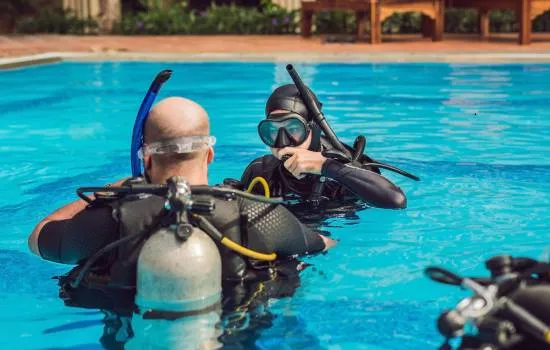Advertisements
How often should you practice? A 10-minute daily routine that really works
If you are just starting out in this breathe correctly Or if you simply want to improve your performance while submerged, you don't need to spend hours training like a pro.
With only 10 minutes a day, you can achieve remarkable and lasting results.
Advertisements
The key is consistency. Taking a small moment out of your day to train your breathing can make a big difference to your overall well-being and, of course, your time underwaterHere's a basic but highly effective routine you can do from home without any special equipment—just your phone and a suitable app.
Step by step:
Advertisements
- First 2 minutes – Guided breathing (with Breathe+)
Begin your workout with slow, deep breathing guided by the Breathe+ app. Follow the visual rhythm on the screen and focus on inhaling and exhaling with control. This phase serves to prepare your body, calm your mind, and reduce your heart rate, which is essential before any breath-retention exercise. - Next 5 minutes – Dry breath holding exercises (with STAmina)
Next, open the STAmina app and do a dry breath apnea routine. Here, you'll learn to hold your breath gradually, increasing the time you spend holding your breath as you progress. Don't worry if you can only hold it for a few seconds at first. The important thing is continued practice. These few minutes will help you train your lungs to safely work with less oxygen. - Last 3 minutes – Deep relaxation and creative visualization
Finally, take a few minutes to completely relax. You can lie down or sit in a quiet place, close your eyes, and imagine yourself floating in the water, feeling calm and light. This visualization not only strengthens your mental connection with the aquatic environment, but also reduces oxygen consumption, training your body to relax in realistic conditions.
This routine, although seemingly simple, is very powerful. If you do it every day, you'll notice how your breathing control improves and how your ability to stay underwater effortlessly progressively increases.
In just a few days, you may find yourself holding your breath longer than you imagined. And in a few weeks, your time underwater It will be something that will fill you with pride, not anxiety.
Consistency is more important than intensity. So don't put pressure on yourself to get it perfect from day one.
What not to do if you want to increase your time underwater
Just as there are many useful techniques that help you breathe correctly and improve your performance in the water, there is also common mistakes that can put your health at risk or slow your progress. Some people, out of anxiety or a desire for quick results, end up making certain mistakes that are best avoided from the start.
Here I explain to you what you should not do under any circumstances If your goal is to last longer underwater safely and naturally:
Don't hyperventilate excessively before diving
One of the most dangerous—and sadly common—mistakes is taking very rapid, deep breaths just before holding your breath. Many people think this will give them more oxygen, but in reality are removing too much carbon dioxide from the bodyAnd what happens then? Your brain stops receiving the signal that it needs air, and you can faint underwater without warning.
Although it may sound contradictory, Carbon dioxide is what tells you when you need to breathe.Without that warning, you can lose consciousness without realizing it. So don't overdo it with the pre-breathing. Just take a few deep, controlled breaths, without rushing or exaggerating. The key is calmness, not speed.
Do not push yourself to the point of dizziness or extreme discomfort.
Yes, it's important to get out of your comfort zone. But it's also important listen to your body's signalsIf during a practice you start to feel dizzy, have blurred vision, rapid heartbeat, nausea, or a feeling of anxiety, stop immediately.
Breathing properly doesn't mean pushing yourself to the limit. It means training intelligently, gradually, and at your own pace. Feeling a little mild discomfort can be part of the process, but if you reach the point of feeling unwell or out of control, it's time to stop. Your health comes first.
Never train alone if you are going to practice in the water
This is basic, but easily forgotten. If you're going to do apnea exercises in a pool, the ocean, or any body of water, never do it without companyThere should always be someone nearby who can help you in case of an emergency.
Even professionals train with supervision. Don't underestimate the risks. A simple loss of consciousness can be very dangerous if no one is by your side. Practice in a safe place, with someone you trust who knows what you're doing.
And if you only have the option to train alone, do it. dry, out of the water. You can perfectly practice breathing, controlled apnea, and relaxation exercises from the comfort of your own home. The important thing is to be consistent and not take unnecessary risks.
Don't ignore your body's physical signals
Your body is wise. It's always talking to you, sending you signals, even if we sometimes don't hear them. If you feel chest pressure, difficulty breathing, pain, dizziness, or any unusual sensation, listen to him.
Don't obsess over improving your underwater time if it means compromising your well-being. Progress should be gradual and gentle with yourself. The most important thing in this whole process is learning to know yourself, respecting your limits, and moving forward safely.
Remember: breathe correctly It's also about knowing when to stop.

Conclusion: Breathe like an expert and conquer the water effortlessly
After everything we've seen, one thing is clear: it's not about having huge lungs or being a professional athlete. It's about breathe correctly, to understand your body and to train little by little, with consistency, patience and respect for your own limits.
Increase your time underwater It's not a goal reserved for a select few. It's a skill that anyone can develop—yes, even you, who right now think you can't hold your breath for even half a minute.
You just need to decide to start. A cell phone, 10 minutes a day, and the desire to improve. Your body will do the rest on its own. You'll learn to relax, get more oxygen, calm your mind... and before you know it, that seemingly impossible minute will turn into two, then three... and so on.
Breathing is life. But breathe correctly is to live better.
